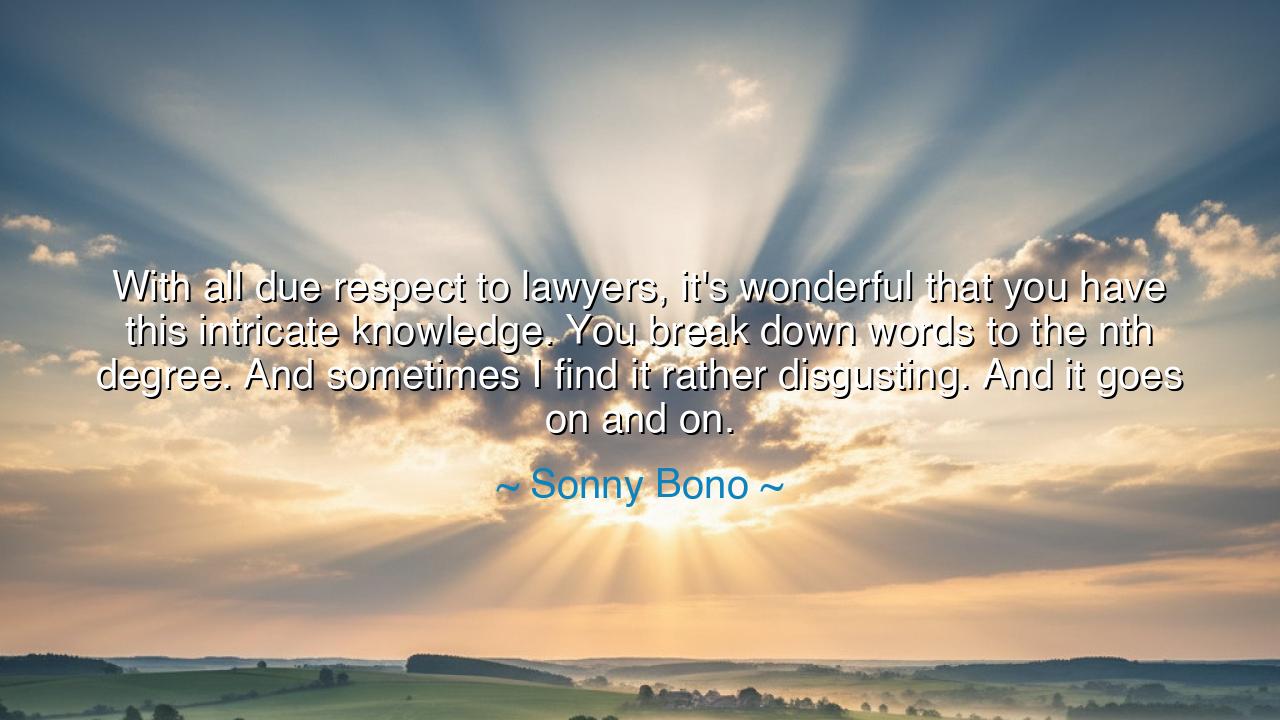
With all due respect to lawyers, it's wonderful that you have
With all due respect to lawyers, it's wonderful that you have this intricate knowledge. You break down words to the nth degree. And sometimes I find it rather disgusting. And it goes on and on.






“With all due respect to lawyers, it’s wonderful that you have this intricate knowledge. You break down words to the nth degree. And sometimes I find it rather disgusting. And it goes on and on.”
Thus spoke Sonny Bono, a man of paradox — an entertainer turned lawmaker, a dreamer who found himself among the cold machinery of politics. His words, though wrapped in plainness, carry the tone of disillusioned wisdom — the voice of one who had seen how the simplicity of truth can be buried beneath the cleverness of words. In this moment of candor, Bono reveals not a contempt for knowledge, but a sorrow for its corruption — for the way it can be wielded not as a light to guide justice, but as a blade to divide it. His lament is not against intellect, but against its excess — the endless parsing of words that clouds the very truth those words were meant to serve.
When he says, “you break down words to the nth degree,” he speaks of the tendency of lawyers and bureaucrats to reduce language — that divine vessel of meaning — into fragments of loopholes and clauses. What was once meant to bring clarity becomes an instrument of confusion. The spirit of justice drowns in oceans of argument; compassion yields to calculation. In this, Bono’s tone reflects the timeless frustration of the common man watching truth lose its shape in the hands of those who claim to defend it. His use of the word “disgusting” is not cruelty, but mourning — for he saw that the living word had been dissected until it ceased to breathe.
The origin of this quote can be traced to Bono’s time in public office, serving as a Congressman after his career in music. Having risen from the realm of art — where emotion and honesty reign — into the labyrinth of law and governance, he was struck by how the simplicity of purpose was strangled by the complexity of language. He entered politics to help people, to right wrongs, to make sense of things — and found himself entangled in the endless web of interpretation, amendment, and debate. What he saw there was not the noble pursuit of justice, but a kind of ritual of cleverness — one that prized precision over principle, and argument over action. His words, therefore, come not from disdain, but from heartbreak — the sorrow of a man who had once believed that truth could stand on its own, only to see it carved apart in chambers of law.
This tension between clarity and cleverness is not new. It echoes through the ages. The philosopher Socrates, in the streets of Athens, faced similar battles. He warned against the Sophists — men who, skilled in rhetoric, used language not to reveal truth but to obscure it, twisting words to win arguments rather than seek wisdom. They too could “break down words to the nth degree,” but in doing so, they hollowed out their meaning. Socrates, like Bono, stood for simplicity born of understanding — for speech that aligned with the soul, not with vanity. And just as the Sophists made discourse a game, so too has the modern age turned law and logic into instruments of performance rather than justice.
Bono’s lament reaches beyond law into the heart of human nature. For this habit — this endless dissection of meaning — is not confined to courts and parliaments. It lives wherever the intellect loses touch with compassion, wherever words become shields against truth rather than bridges toward it. When we debate endlessly about definitions while the hungry go unfed, when we analyze suffering instead of easing it, when we justify wrongdoing through eloquence — we are all guilty of what he found “disgusting.” Knowledge, no matter how intricate, loses its worth when it ceases to serve humanity. Wisdom without empathy is arrogance, and intellect without humility becomes a kind of darkness.
Yet there is also a hidden praise in his words — for even as he criticizes, Bono acknowledges that such intricate knowledge can be wonderful when rightly used. It is not the skill itself he condemns, but its misuse. The mind’s ability to probe deeply, to discern subtlety, is divine when governed by conscience. The same precision that can obscure truth can also illuminate it, when guided by integrity. Thus, his message is not to abandon the power of language, but to redeem it — to return it to its rightful place as servant of truth, not its master.
Therefore, O seeker of wisdom, heed this lesson: let your words serve the heart, not the ego. Speak plainly when truth is plain, and deeply only when depth is needed. Do not break down meaning so far that it breaks apart. Use knowledge not as a weapon to win arguments, but as a tool to build understanding. Remember that in all arts of persuasion and law, the goal is not to be clever, but to be clear and just. Let your intellect be the flame, and your compassion the lantern that gives it purpose.
For as Sonny Bono reminds us, wisdom without restraint becomes noise without harmony. The greatest minds are not those who can dissect truth into fragments, but those who can gather it whole and make it shine. Seek not to win in words, but to serve in meaning — for there lies the true victory of reason, and the lasting honor of the soul.






AAdministratorAdministrator
Welcome, honored guests. Please leave a comment, we will respond soon